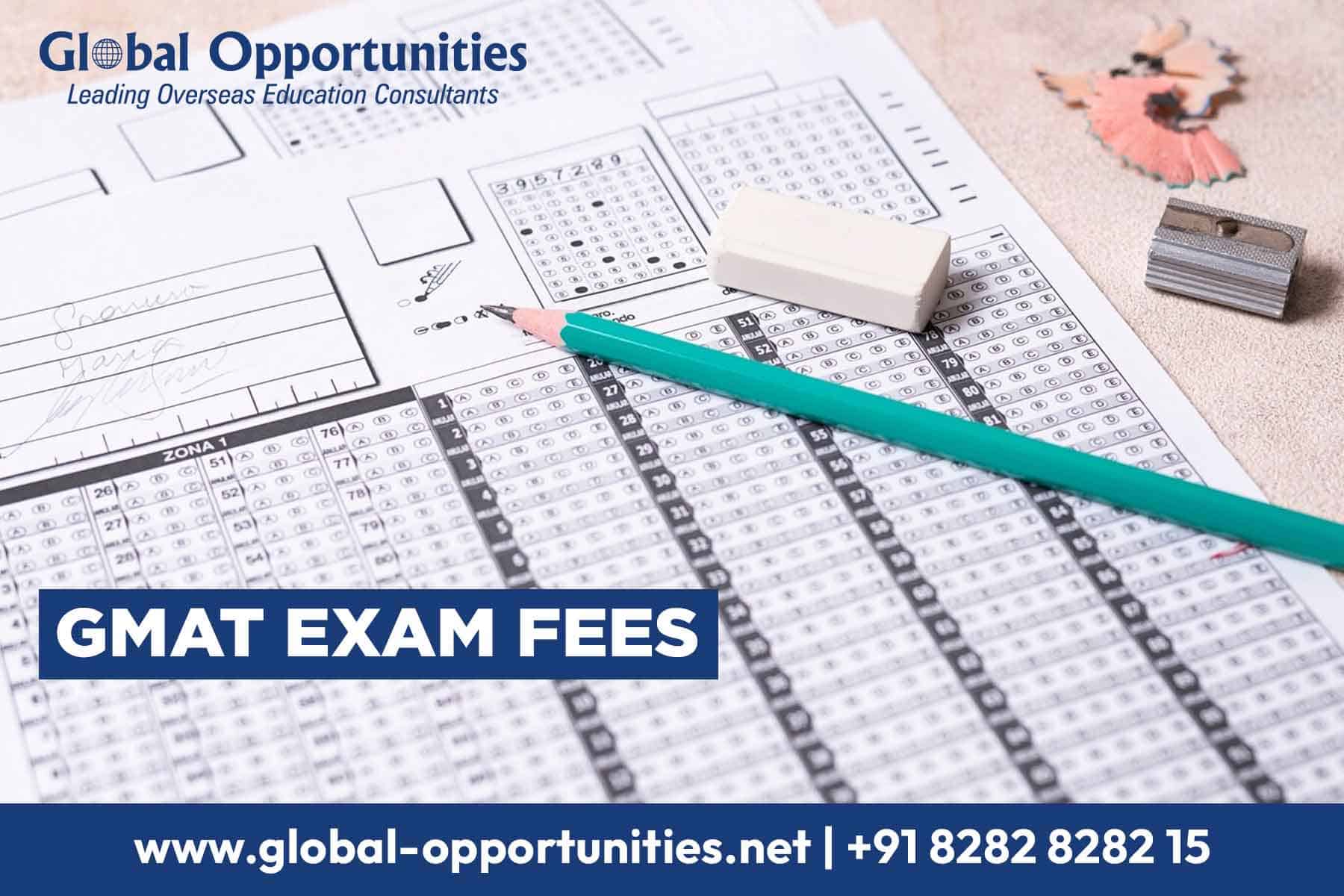GMAT Exam Fees 2025 – Registration, Cancellation, Scholarships

 GMAT Exam Fees is $275 (Approx. 23,000) as per 2025 – 2026 in India. GMAT which is known as the graduate management admission test is also a crucial milestone for aspiring professionals worldwide. The GMAT is a standardized test that evaluates analytical, writing, quantitative, verbal and reading skills which is a applicable only to management & other business colleges.
GMAT Exam Fees is $275 (Approx. 23,000) as per 2025 – 2026 in India. GMAT which is known as the graduate management admission test is also a crucial milestone for aspiring professionals worldwide. The GMAT is a standardized test that evaluates analytical, writing, quantitative, verbal and reading skills which is a applicable only to management & other business colleges.
GMAT Registration Fee 2025
The GMAT registration fee is US $275 (Approx. 23,000) as per 2025-2026 in India which happens in described test centers and in the US it costs around $300 ( Approx 25,000) for the online GMAT exam. If the candidate wishes to cancel or reschedule the GMAT exam they will have to pay a fee for the same. There is also a score report fee where once the GMAT exam is completed, the test takers receive their unofficial scores immediately. However, if they wish to send their scores to specific business schools, additional fees apply. It’s essential to factor in these costs when budgeting for the GMAT.
GMAT Cancellation Fee
The cost of cancellation of the GMAT exam depends upon the date of cancellation of the exam. If the cancellation is more than 60 days before the GMAT exam date students will receive a $110 (INR 9,172) refund in the case of test center GMAT and a $120 (INR 10,006) refund in case of online GMAT exam at home.
GMAT Scholarships
The GMAT scholarship scheme is usually of three types the very first is the need based scholarship which is usually provided to students with less privileged backgrounds, the second is the merit based scholarship which is provided to students with excellent academic scores or achievement in extracurricular activity and the third one which is the last one is the gender based and external scholarships which is provided by agencies and organizations.
- MAT Fee Waivers: The Graduate Management Admission Council (GMAC), the organization responsible for the GMAT, occasionally offers fee waivers to eligible candidates. These waivers cover the cost of the GMAT exam, providing a valuable opportunity for deserving individuals to pursue their business education goals without the financial strain.
- Financial Assistance Programs: Some business schools and educational institutions in India may offer financial assistance programs to international students. These programs may include partial or full coverage of GMAT exam fees as part of the overall financial support package.
- Corporate Sponsorships: In certain cases, corporations may sponsor employees or potential hires to take the GMAT as part of their professional development. This sponsorship often includes covering the GMAT exam fees, reflecting the company’s commitment to investing in the growth and skill development of its workforce.
- Nonprofit Organizations: Several nonprofit organizations and foundations are dedicated to promoting education and equal access to opportunities. Some of these organizations may provide scholarships specifically for GMAT exam fees, enabling talented individuals to pursue their business education aspirations.
If you are planning to take the GMAT it is best to take the exam for students who have an outstanding academic record and have a GMAT score between 650 to 700.
Advantages to GMAT Exam in India for Foreign Studies
The GMAT (Graduate Management Admission Test) is a standardized test widely used for admissions into graduate management programs, including MBA (Master of Business Administration) programs, across the globe. For international students considering foreign studies, taking the GMAT in India offers several advantages:
- Convenience and Accessibility: Taking the GMAT in India is convenient for international students who may be residing or studying in the country. This eliminates the need for extensive travel to their home countries or other testing locations, reducing logistical challenges and expenses associated with the exam.
- Diverse Business Education Options: India hosts a diverse range of business schools offering various MBA and related programs. By taking the GMAT in India, international students can explore a broad spectrum of business education options, from traditional MBA programs to specialized courses tailored to different industries and sectors.
- Cost-Effective Exam Fees: The GMAT exam fees in India are often more cost-effective compared to some other regions. International students may find it financially advantageous to take the GMAT in India, especially when considering the overall costs of preparing for and applying to business schools.
- Exposure to a Competitive Pool of Candidates: India is known for having a highly competitive pool of GMAT test-takers. By participating in the GMAT testing environment in India, international students get the opportunity to gauge their abilities and compete with a diverse and talented group of candidates. This experience can be valuable in preparing for the competitive nature of global business school admissions.
- Networking Opportunities: India’s vibrant business environment and the presence of multinational corporations provide international students with unique networking opportunities. Engaging with professionals and fellow test-takers during the GMAT preparation phase or at testing centers can contribute to building a global professional network.
- Strategic Location for Business Studies: India, as an emerging economic powerhouse, offers a strategic location for business studies. Students can gain insights into the dynamic business landscape and develop a deep understanding of emerging markets, which is increasingly valuable in today’s interconnected global economy.
Challenges to GMAT Exam in India
How to Prepare for the GMAT?
The GMAT expert tutors advise that a minimum of 6 months of dedicated preparation for the GMAT would help students secure a good score in the test. In maximum cases if an aspirant’s english language skills are way better than their mathematics and quantitative aptitude skills then students should focus on solving quantitative problems and if it is the other way around and the aspirants english language skills are weak, then read more, do more grammar exercises, and improve the vocabulary.
Engaging in the writing exercise will undoubtedly prove beneficial when confronting the essay component on the GMAT.
Numerous online forums and websites, available in both free and paid versions, provide a range of simulated GMAT mock tests. These mock tests closely mirror the format of the actual GMAT exam, aiding in enhancing your response speed and preparing you for the real test. Additionally, paid websites assess your test performance, delivering personalized reports containing tips to strengthen your weaker subject areas.
Some of the tips and tricks to prepare for GMAT exams are:
- Planning the Syllabus Strategically: It is very important to create a study plan to have success in the GMAT exam. Aspirants can start with core areas such as quant, verbal, integrated reasoning and slowly & gradually progress to more advanced topics.
- Practice Regularly: Consistent practice is the key to success in GMAT. It is very important for aspirants to solve a variety of practice questions and take full length mock exams to stimulate the test experience. This also helps to improve the speed, accuracy and time management skills which also helps to analyze the performance and identify areas which need improvements.
- Review Key Concepts: Achieving success in the GMAT requires a strong grasp of fundamental concepts and principles in both quantitative and verbal reasoning. Familiarize yourself with essential formulas, grammar rules, and vocabulary words. Sharpen your problem-solving skills by practicing with questions from past GMAT exams.
- Seek Guidance: Contemplate the option of joining a GMAT preparation course or collaborating with a tutor for tailored guidance and assistance. These professionals can assist in pinpointing your strengths and weaknesses, offering constructive feedback on your performance, and providing effective strategies for enhancement.
- Stay Motivated and Confident: Getting ready for the GMAT might be tough, but it’s crucial to stay motivated and confident. Set achievable goals, monitor your progress, and take time to celebrate the small wins. Keep in mind that your GMAT score is just a part of your entire application. Doing well can unlock opportunities for you at renowned business schools overseas.
Eligibility Criteria for GMAT Exam in India
Few factors to consider when checking the GMAT eligibility criteria are:
- Age Requirements: Any aspirant taking the GMAT exam must be at least 18 years old. Candidates between the age of 13 and 17 can also take the test if they provide written proof of their parent’s consent.
- Educational Qualification: As per the current information available with us the GMAT exam does not have specific educational qualification for appearing in the test. The GMAC authority has voluntarily not prescribed the eligibility criteria in terms of educational qualification as it all depends upon the business school related to their specific eligibility criteria and standards.
- Global Recognition: The GMAT exam is a well known exam which is recognized by over 7000 graduate management programs worldwide. By obtaining a competitive GMAT score an aspirant increases their chances of getting admitted in some of the best top international MBA programs.
Conclusion
In conclusion, navigating the GMAT exam fees in 2025 is a crucial aspect of the journey for aspiring business professionals. The fees, comprising registration, rescheduling, cancellation, and score report fees, form an integral part of the overall investment in one’s education and career advancement.
Understanding the GMAT exam fees in India for international students involves not only recognizing the financial commitments but also exploring available scholarship opportunities. Fee waivers, financial assistance programs, corporate sponsorships, and support from nonprofit organizations can significantly alleviate the financial burden for deserving candidates.
While the financial aspect is a significant consideration, it’s important for prospective test-takers to keep the broader perspective in mind. The GMAT serves as a gateway to a global education and career opportunities, and the investment in preparation and exam fees is an investment in a transformative future.
FAQs
What are the GMAT exam fees for Indian students?
The GMAT exam fees for Indian students are $275, which is approximately INR 22,000 -23,000 depending on the currency exchange rate at the time of payment.
What does the GMAT exam fees cover?
The GMAT exam fee includes:
- Registration for the exam
- Sending scores up to five programs of your choice
- Access to official GMAT resources, like the GMAT Handbook
When will the GMAT exam date 2025 be available for registration?
You can start booking your GMAT exam date 2025 as early as six months before your desired test date. The registration is available year round and you can select a test date based on availability at your preferred test center or for the online GMAT.
What is the “GMAT exam cost” for Indian students?
The GMAT exam cost for Indian students is USD 275 or INR 23,091 for testing at a test center, and USD 300 or INR 25,190 for the online exam.
What is the GMAT exam fee in India for international students?
The GMAT exam fee in India for international students is USD 275 or approximately INR 23,091 for testing at a test center. For the online GMAT exam, the fee is USD 300 or INR 25,190.
What is the GMAT 2025 exam date?
The GMAT 2025 exam date for Indian students is USD 300 (Rs. 25,040) fee for online Test and USD 275 (Rs 23,000) fee for in person test.
What are the GMAT eligibility criteria 2025 for international students?
The GMAT eligibility criteria 2025 for international students include the following:
- Age Requirement: Candidates must be at least 18 years old. If aged 13–17, parental or guardian consent is required.
- Educational Qualification: No specific minimum qualification is required, but candidates should ideally have completed undergraduate studies to align with MBA admission requirements.
- Number of Attempts: You can take the GMAT up to five times in a rolling 12-month period and a maximum of eight times in a lifetime.
- Time Between Tests: A minimum gap of 16 days is required between attempts.
What is the structure of the GMAT 2025?
The GMAT 2025 structure consist of four sections:
- Analytical Writing Assessment (AWA)
- Integrated Reasoning (IR)
- Quantitative Reasoning
- Verbal Reasoning
The total test duration is approximately 3 hours and 7 minutes, excluding breaks.
Tag:GMAT Exam Fees, GMAT Fees



